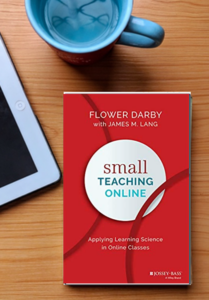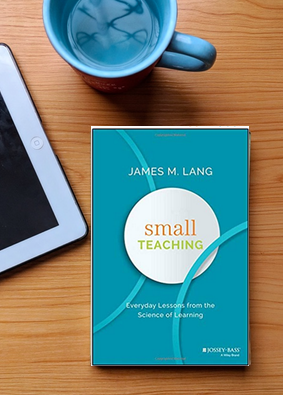This post is by Peter Arthur.
Chapter 9 BIG Idea
Expand your view of what student learning may look like in your learning environment: Activity-Based Learning, Service Learning, and Games & Simulations are three big teaching pathways that are logical extensions of the first 8 chapters of the book. Additionally, the author refers to “Big Teaching”, which is giving students the opportunity to make a positive difference in the world, immersing them in real-world problems, activities and forcing them to think creatively and think together about all the logistics of the course and the program itself … creating a powerful learning experience. I see these three types of learning environments a paradigm shift from a learner as a consumer of information to someone who is actively engaged in creating and sharing knowledge.
Models, Principles and Resources
1. Activity-Based Learning
Activity-based learning “involves fieldwork, public service, community-based research and internships in conjunction with in class work”. These activities do not have to take all term i.e. a single class, or a week or two. Another way he conveys this type of learning is an extension from the confines of the classroom to a more public space. Students convey their learning to a more public purpose.
Principle: Ask students to do whatever people do outside of your class in your discipline or with the specific content and skills you are teaching them. The author uses the example of his writing students using placed-based skills to write travel essays for the newspaper or magazines.
Resources Mentioned:
• http://ablconnect.harvard.edu gathering place of research, examples, and ideas for pedagogical innovation in higher education.
• Bean, J. C. (2001). Engaging ideas: The professor’s guide to integrating writing, critical thinking, and active learning in the classroom. San Francisco: Jossey-Bass.
2. Service Learning
Service learning is a win/win. A win for an exceptional student learning experience and at the same time contributes to the local, regional and global community. This type of learning provides real-world exposure and engagement with meaningful local and global issues.
Principle: To support your implementation of service learning leverage your higher education’s resources i.e. service learning office to assist with connecting students with local community organizations. Additionally, seek a colleague who is already leveraging service learning to learn more.
Peter’s experience: Service learning can be a very transformative experience! I recommend checking first to see if your institution has a service learning office. Additionally, you may want to consult your Centre for Teaching and Learning. To increase the chance of success, I think it is really important to make sure the external organization is well prepared for students. Often external organizations are not educators and it is important to clarify the role of the organization and your students. Further, it is important that your students are well prepared to be engaging with the public (examples will be shared with the book club) and have been taught how to reflect in order to get the most from their experiential learning.
Resource Mentioned:
• Jacoby, B., & O’Reilly for Higher Education. (2014). Service-learning essentials: Questions, answers, and lessons learned (1;1st; ed.). San Francisco, CA: Jossey-Bass.
An example of Service Learning at UBC Okanagan: students engaged with communities in India and Haida Gwaii
3. Games and Simulations
The author provides one main example of games and simulations: Reacting to the past is a role-immersion game where students are put into place as historical actors at key moments of crisis or transition in human history and play out their own version of those historical events to some final conclusion.
Principle: A simple way to for an instructor to try out games and simulations is to try a reacting game, as they have been used in higher education classes for a long time. Check the consortium website to see if there is a game already created for your context. Additionally, recommends reading Minds on Fire (see below).
Resource Mentioned:
• Reacting games: https://reacting.barnard.edu
• Carnes, M. C., & Harvard University Press 2014 eBooks (Canadian Institution). (2014). Minds on fire: How role-immersion games transform college. Cambridge, Massachusetts: Harvard University Press.
Note: This section triggered my memory of Professor David Kaufman (SFU) $3 million Simulations and Advanced Gaming Environments for Learning (SAGE) SSHRC grant. This is an area where there are many great examples beyond reacting simulations.
QUICK TIPS: Expanding YOUR Learning
1. Commit to reading at least one new teaching and learning book every year. (For example join BCcampus book club each year!)
2. Subscribe to an email list.
3. Create a personal learning network.
4. Attend a teaching and learning conference. i.e. Festival of Learning May 2020
5. Engage with your Centre for Teaching and Learning events.
Out of all the books the author recommends, I have engaged with and highly recommend:
• Bain, K. (2004). What the best college teachers do. Cambridge, Mass: Harvard University Press.
• Brown, P. C., Roediger, H. L., III, & McDaniel, M. A. (2014). Make it stick: The science of successful learning. Cambridge, Massachusetts: The Belknap Press of Harvard University Press.
• Ambrose, S. A., & O’Reilly for Higher Education. (2010). How learning works: Seven research-based principles for smart teaching (1st ed.). San Francisco, CA: Jossey-Bass.
Questions to Connect to Your Life
1. How have you used Activity-Based Learning, Service Learning and/or Games/simulations in an educational context? Any advice?
2. Do you have any recommended books, email lists, teaching and learning conferences that you recommend to colleagues? How do you grow as an educator?
Join us as we chat about “Chapter 9: Expanding” in Mattermost this week and for our final live web conference meetup on Friday, November 15th at 11:00am PST. It’s easy to create an account and join in on the discussion. See How to Participate.




